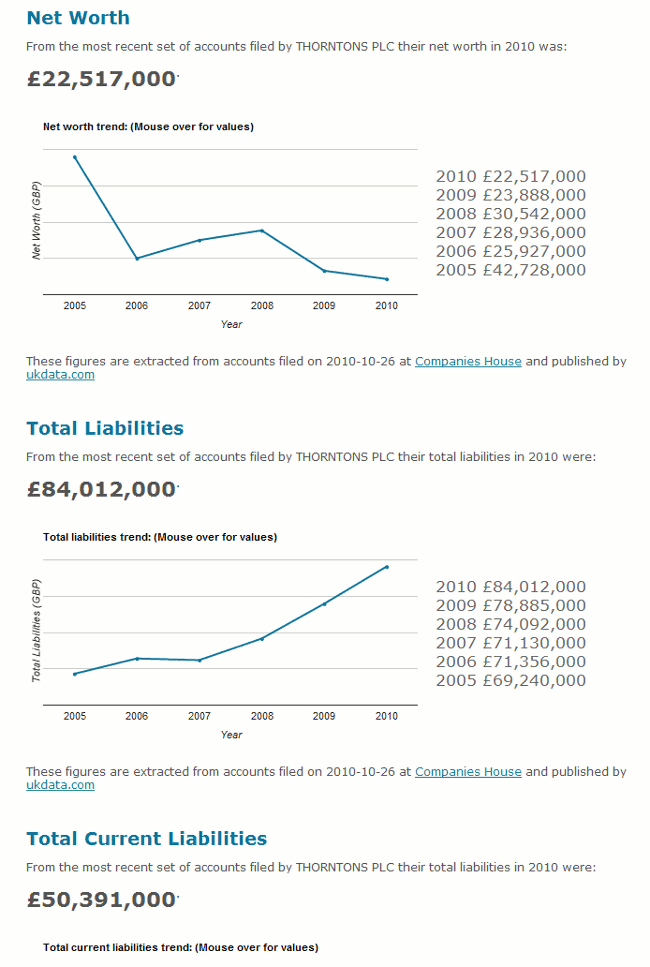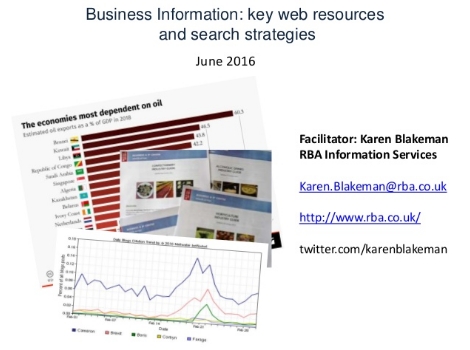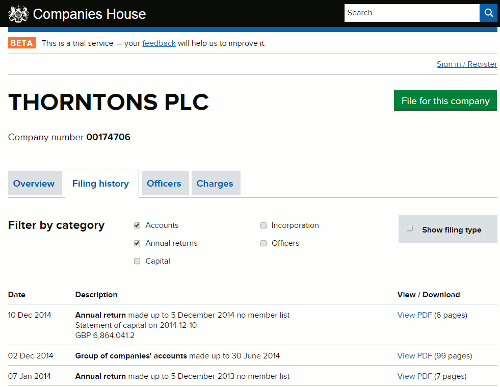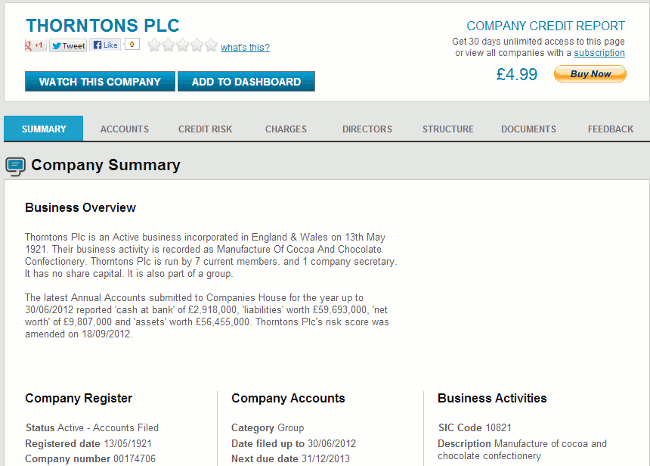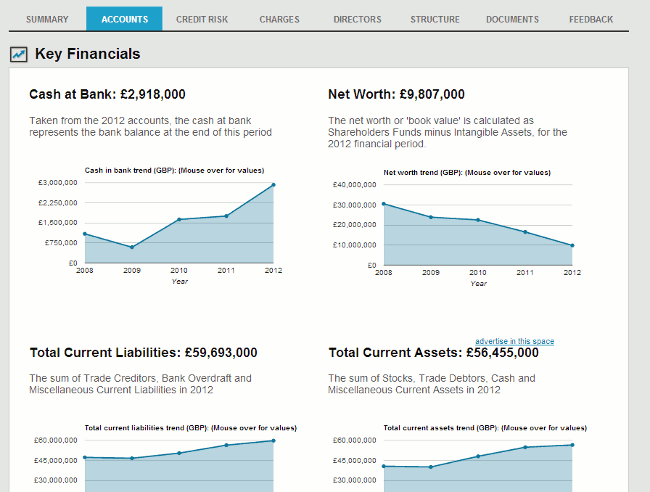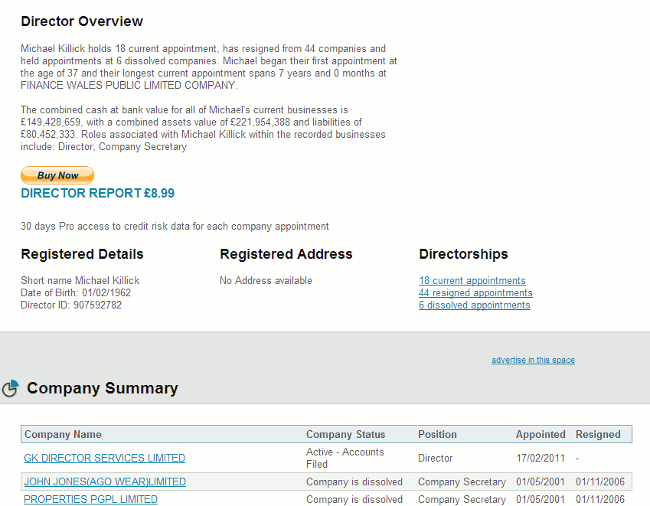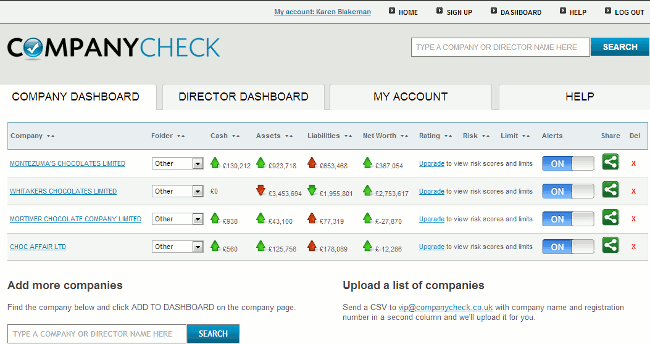Some of the slides that I used as part of my June 2016 workshops on Business Information are now available on both SlideShare and authorSTREAM. The workshop run in the last week of June inevitably included a session on the EU referendum and the Brexit result. A few of those extra slides are included in this edited version of the presentation.
Tag Archives: company information
Small companies now allowed to be bigger … or smaller
One of the services I provide is company research including official registry documents and accounts. Many registries, including, the UK’s Companies House, make a significant amount of their data available free of charge. Some still charge for documents and a few insist that you register before you can even search for a company. If I know the information is freely available I usually point the client at the relevant website but a few people come back to me when they discover that the interface is in a foreign language. If registration and/or payment are required I’m often asked to search on the client’s behalf because they just do not want the hassle of going through the registration process and recouping the cost of a small overseas transaction from their accounts department.
Regardless of whether the information is free or charged for, I often receive what I call a second stage request for more detailed accounts. Why is there no Profit & Loss? Where is the revenue/turnover figure? I then have to explain how the reporting and filing requirements differ depending on the country, or even state; and then I have the joy of taking the client through small company exemptions. Some people I know have only just got their head around the changes introduced by UK Companies Act 2006. I now have to tell them that this has changed yet again.
In March 2015 the UK Government approved new regulations that implement the requirements of the new EU Accounting Directive. The changes came into effect in the UK from 1 January 2016. There are a number of changes, which may reduce yet further the amount of information that small companies are required to provide, and there are also changes to what is deemed to a be a “small” company. Small companies can now be bigger.
A company can now qualify as small if meets at least two of the three following criteria:
- turnover not more than £10.2m (previously £6.5m)
- balance sheet total not more than £5.1m (previously £3.26m)
- average number of employees not more than 50 (no change)
Information on some of the other changes can be found on the Companies House Blog – Changes to accounting standards and regulations. The key ones are:
“… the removal of the ability for a small or medium-sized company to file abbreviated accounts with us at Companies House. A company will now be required to file the accounts they prepare for their members at Companies House (although a small company or micro-entity will usually be able to choose not to file their profit and loss account or director’s report).”
“However, this does not mean that all small companies are now required to file full accounts, the very smallest companies may disclose less information by preparing micro-entity accounts. Other small companies may, instead of filing full accounts, choose to prepare a set of abridged accounts for their members and then file these with us.”
So, as well as “small” being allowed to be bigger we now have even smaller companies or “micro-entities” who can choose to disclose less information. The whole thing is beginning to look as clear as mud!
The ICAEW has a useful overview of what is happening at The revised UK small companies regime but if you want to keep up with the latest updates then follow the Companies House Blog.
UK company information now free of charge
A year ago Companies House announced that they were going to make all of their company information available free of charge to everyone. The press release was short on detail and many of us wondered what format the data would be in and how easy it would be to use. Daily files containing accounts data registered on the previous day were already available but these are huge zip files that, when unpacked, contain files with meaningless names. (http://download.companieshouse.gov.uk/en_accountsdata.html). Unless you have software that can manage and search the data it is impossible to identify which files contain information on the company you are researching. 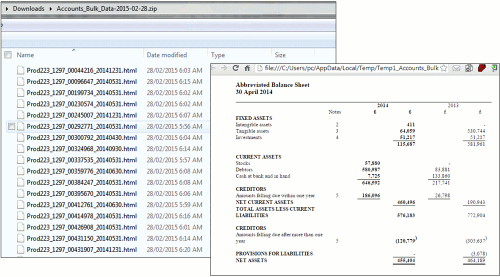
For most of us the files are useless. Was this to be the format of the free service? Thankfully, no.
A new beta service at http://beta.companieshouse.gov.uk/ now enables you to search for companies by name or number and obtain free of charge:
- Company overviews
- Current and resigned officers
- Document images
- Mortgage charge data
- Previous company names
- Insolvency data
For the officers you can see what other companies they are involved with. What you cannot do at the moment is search by director name from the start. That is a “planned feature” as are disqualified directors search, company monitoring, company name availability, dissolved companies and overseas data. For those options you have to revert to the old WebCHeck service at http://wck2.companieshouse.gov.uk/.
The new beta service is easy to use and at last we have access to UK company documents and accounts free of charge. So, does this mean the end of services such as Company Check (http://companycheck.co.uk/) and DueDil (http://www.duedil.com/)? Not necessarily. Company Check, for example, already has an option for searching by director name and there are also useful charting, monitoring and structure options as well as access to some European companies. They also offer access to risk scores, credit reports and County Court Judgments (all priced). All of these services only allow you to search for companies one at a time: there is no multi-criteria search that you can use to find companies by turnover, number of employees, industry sector for example. Neither can you compare companies or conduct a detailed peer group analysis. For that you still have to use priced services such as BvD (http://www.bvdinfo.com/)
Overall, a move in the right direction and ideal if your needs are simple, for example accounts and director information for a live company. But look carefully at what features are available before you cancel your subscription service.
Business information key resources
On one of my recent workshops I was asked if I used Google as my default search tool, especially when conducting business research. The short answer is “It depends”. The long answer is that it depends on the topic and type of information I am looking for. Yes, I do use Google a lot but if I need to make sure that I have covered as many sources as possible I also use Google alternatives such as Bing, Millionshort, Blekko etc. On the other hand and depending on the type of information I require I may ignore Google and its ilk altogether and go straight to one or more of the specialist websites and databases.
Here are just a few of the free and pay-per-view resources that I use.
Information on industry sectors
 My favourite collection of guides on industry sectors is The British Library Business Information and IP Centre’s industry guides. These highlight relevant industry directories, databases, publications and web sites and are excellent starting points if you are new to a sector
My favourite collection of guides on industry sectors is The British Library Business Information and IP Centre’s industry guides. These highlight relevant industry directories, databases, publications and web sites and are excellent starting points if you are new to a sector
Statistics
There are at least a dozen statistics sites that I use on a regular basis but if I’m unsure of where to look or want to make sure I haven’t missed anything I use OFFSTATS – Official Statistics on the Web at http://www.offstats.auckland.ac.nz. A great starting point for official statistical sources by country, region subject or a combination of categories. All of the content in the database is in the public domain and available through the Internet and has been quality assessed by staff at The University of Auckland Library.
Official company information
If I want to confirm the existence of a company or obtain filings and accounts I usually go direct to the relevant official company registry. I have a list of the registries that can be searched online at http://www.rba.co.uk/sources/registers.htm. As many of my enquiries are for UK companies I am a frequent visitor to Companies House at http://www.companieshouse.gov.uk/. Some information is free but filings and accounts are priced. There are several companies that repackage Companies House data and sometimes make extra data or analysis free of charge for example Company Check at http://www.companycheck.co.uk/, which enables you to search by company or director’s name. Risk reports, information on CCJs, and some official filings are priced if you do not have a subscription to the full service.
Share price information
For free share price information I use Yahoo Finance (http://uk.finance.yahoo.com/) and Google Finance (https://www.google.co.uk/finance). Both of these services provide charts and news on shares on the major stock markets. Google’s graphs are ‘annotated’ with labels that link to news articles listed to the right of the graph, so you can see whether or not a particular event or announcement has affected a share price. Both offer free, daily historical share prices in figures. As well viewing historical graphs for share prices you can download the data as a spreadsheet.
News alerts
For news alerts I use a mixture of bookmarked searches, Google email and RSS alerts, and RSS feeds from a wide range of blogs and news sites. I find that Google alerts are erratic and unreliable but they do sometimes pick up something unique so I still include them in the mix. RSS feeds are my main source of current awareness and when a news feed is rather broad in coverage I use my RSS reader’s search function to identify the articles that are of interest to me. I use a desktop reader call RSSOwl (http://www.rssowl.org/) but Inoreader (http://inoreader.com/) is a web based service that offers similar features and options.
Who is behind a site?
If I am to use any information from the web for business purposes I need to know who is behind the website. DomainTools http://www.domaintools.com/ is one of many services that will tell who owns a domain name, unless they are hiding behind an agent or privacy protection service. There is also a Whois+ extension for Chrome (my default browser) that can be used to run a quick and easy check on the domain name of a displayed page.
Workshop
If you are interested in finding out more about business information resources I am running a workshop for TFPL in London on March 6th , June 6th 2014. Details are on the TFPL website.
Update: please note change of date for the next business information workshop. It is now being held on June 6th, 2014.
Company Check: free UK company and director information
Company Check (http://companycheck.co.uk/) and its sister website Company Director Check are two of the more popular services on my business and search workshops. They repackage official information from Companies House and provide much of it free of charge. I first reviewed them in 2011 (http://www.rba.co.uk/wordpress/2011/07/20/company-information-company-check-gives-more-uk-data-for-free/ and http://www.rba.co.uk/wordpress/2011/11/14/free-uk-company-information-company-director-check/) and since then there have been many updates and additions. A recent change is that company and director information have been pulled together on the Company Check website making it easier to flip between companies and directors. Data on companies in Ireland is also now available.
Companies and directors can be searched from the same search box. You then select the appropriate entry from a list of possible matches. The company summary is free of charge and includes a business overview, data on its status and business activities, and a list of trading addresses.
Also free of charge are the accounts and list of directors but you have to register (free of charge) to view the information. There are options for logging in with your Facebook, Twitter or Google account but if you prefer you can register a user name and password.
Five years of key financials (cash at bank, net worth, total current liabilities and total current assets) are shown as graphs and more detailed information is displayed in the Company Accounts Table.
The financial statements submitted to Companies House can be downloaded free of charge as PDFs. Other documents lodged at Companies House such as “Change of director’s details” or “Allotment of securities” are listed under the Documents tab and are £2 each.
The Credit Risk information (risk score, credit limit, payment data and key factors) and Charges (mortgages and County Court Judgments) are priced. For a single company the price is £4.99 + VAT, which gives you 30 days unlimited access to all premium credit data on that company for 30 days. If you are likely to be researching more than four companies on a regular basis it is worth upgrading to the All Companies options costing £20 + VAT. This gives you 30 days unlimited access to credit data across every company and director.
Current directors and secretaries for a company are listed free of charge. Previous directors and secretaries are part of the subscription service. The free director profile includes an overview, their registered details and a summary of the companies of which they are or have been a director. This can be more informative as a way of identifying connections between companies and other directors than looking at the company records in isolation. The full director report reports are £8.99 and include credit risk, CCJs, mortgages and charges, and a summary for each current appointment with key information taken from the associated company report.
For both companies and directors you can set up free alerts and add them to a dashboard. This is an easy way to compare results for companies, with negative and positive changes in key financials shown as red or green arrows pointing up or down.
Company Check is not the only service providing free access to some of UK Companies House and Ireland company data. DueDil (http://www.duedil.com/) and Bizzy (http://bizzy.co.uk) are two others that are worth looking at. I understand, though, that Company Check is working on additional services that are due for launch in the next few months. It will be interesting to see what they come up with.
Business information slides and top tips
My latest business information workshop, organised by TFPL, was held yesterday in London. A large chunk of the session was taken up with exploring and discussing web sites but we also looked at how advanced search options and commands can be used to focus on higher quality business information. An edited version of the slides is available on authorSTREAM at http://www.authorstream.com/Presentation/karenblakeman-1775787-business-information-key-web-resources/ and Slideshare at http://www.slideshare.net/KarenBlakeman/business-information-key-web-resources-19252576.
Towards the end of the afternoon the participants were asked to come up with a list of top 10 tips and tricks. Two more were submitted to me by email soon after, so we have a dozen in total.
1. Verbatim
Google automatically looks for variations on your search terms and sometimes drops terms from your search without telling or asking you. Neither of these are very helpful if you are looking for a company or a person. Quote marks around phrases or individual words do not always force an exact match or inclusion in the search. If you want Google to run your search exactly as you have typed it in, click on ‘Search tools’ in the menu above your results, then click on the arrow next to ‘All results’ and from the drop down menu select Verbatim.
2. Reading Level
Try ‘Reading level’ if Google is failing to return any research or business related documents for a query. Run your search and from the menu above the results select ‘Search tools’, ‘All results’ and from the drop menu ‘Reading level’. Options for switching between basic, intermediate and advanced reading levels should then appear just above the results. Google does not give much away as to how it calculates the reading level and it has nothing to do with the reading age that publishers assign to publications. It seems to involve an analysis of sentence structure, the length of sentences, the length of the document and whether scientific or industry specific terminology appears in the page.
3. Guardian Data Store http://www.guardian.co.uk/data
This section of the Guardian posts articles, charts, graphs and maps on stories in the news using official government data, datasets collected and published relevant organisations and sometimes data obtained via Freedom of Information (FoI) requests. Links to the original datasets are provided so that you can download the raw data.
4. filetype:
Use the filetype: command to limit your research to PowerPoint for presentations, spreadsheets for data and statistics or PDF for research papers and industry/government reports. Note that in Google filetype:ppt and filetype:xls will not pick up the newer .pptx and xlsx formats so you will need to incorporate both into your strategy, for example filetype:ppt OR filetype:pptx, or run separate searches for each one. In Bing.com, though, filetype:pptx will pick up both .ppt and .pptx files.
5. site:
Include the site: command in your search to focus your search on particular types of site, for example site:gov.uk. You can also use -site: to exclude a site or group of sites from your search, for example:
potato yields forecasts 2013 site:gov.uk -site:www.gov.uk
to run the search on UK government web sites but excluding the new www.gov.uk site.
6. Duedil chart
Duedil (http://www.duedil.com/) is one of several companies that repackage Companies House data and makes some of available free of charge. The workshop participants particularly liked the company Group visualisations.
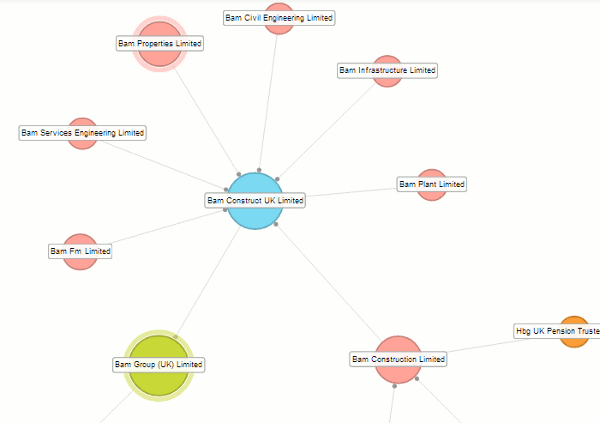
7. Company Check http://www.companycheck.co.uk/ and Company Director Check http://company-director-check.co.uk/
Like Duedil, both of these services repackage Companies House data. Company Check provides 5 years of figures and graphs for Cash at Bank, Net Worth, Total Liabilities and Total Current Liabilities free of charge and lists the directors of a company. Click on a director’s name and you are taken to the Company Directory Check where you can view other current and past directorships for that person.
8. RSS feeds
Several of those attending the workshop already use, or are considering using, RSS feeds as a means of monitoring events and companies. Google is closing down Google Reader but Phil Bradley has lists of alternatives at http://philbradley.typepad.com/phil_bradleys_weblog/2013/03/20-alternatives-to-google-reader.html and
http://philbradley.typepad.com/phil_bradleys_weblog/2013/03/even-more-33-google-reader-alternatives.html
9. BL BIPC industry Guides
The British Library Business Information and IP Centre’s industry guides at http://www.bl.uk/bipc/dbandpubs/Industry%20guides/industry.html highlight relevant industry directories, databases, publications and web sites. Excellent starting points if you are new to the sector.
10. Domain Tools http://www.domaintools.com/
A useful tool for identifying who owns the domain name of a web site. Alarm bells should start ringing in your head if the owner is hiding behind an agent or a privacy protection service.
11. GBRdirect http://www.gbrdirect.eu/
A single point of access to the official company registries of 22 European countries. As well as searching for companies your can search company appointments and personnel for some countries, and verify VAT numbers. The amount of information that is disclosed varies depending on the country and details of what is available is included in the price list at http://gbrdirect.eu/priceList.aspx. The information that it finds will be in the original language.
12. Numeric range
This command is unique to Google. Use it for anything to do with numbers – years, temperatures, weights, distances, prices etc. Simply type in your two numbers separated by two full stops as part of your search. For example: world oil demand forecasts 2015..2030
This workshop is being held again on Thursday, 19th September 2013 in London. The content will have changed by then – in fact, some things have already changed! – and participants are encouraged to let us know the areas and topics in which they are particularly interested and areas of research that cause them problems. This enables me to tailor the event to the needs of those attending. Hands-on practical sessions are included so that everyone has a chance to try out the sites and techniques for themselves. Further details of the day are on the TFPL website.
Information on companies in Israel
All companies in Israel must register with The Registrar of Companies at the Ministry of Justice (http://www.justice.gov.il/MOJEng/) and the tax authorities. The register can be searched at http://havarot.justice.gov.il/ using part or all of a company name in English or Hebrew, or by entering the company number.
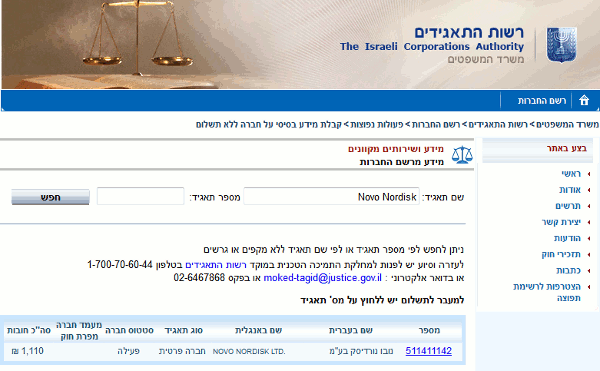
The search interface and the results are in Hebrew but if you are using Google Chrome the built-in translator does a reasonable job of translating the text into English.
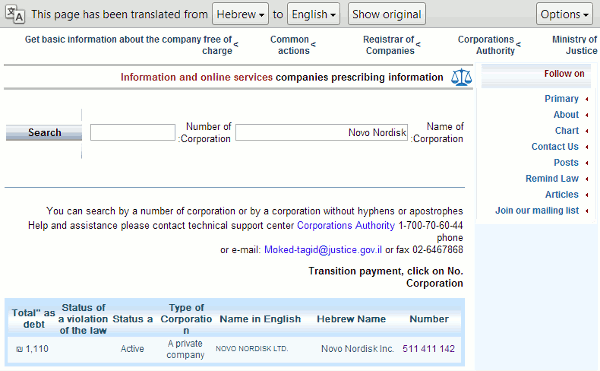
Free information on a company includes type of company, address, legal status and purpose of the company.
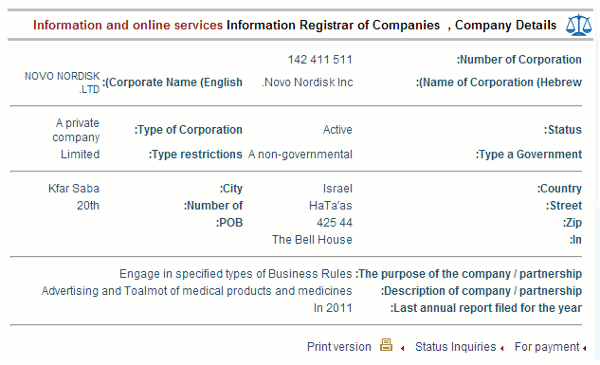
Additional information such as details of directors, total authorized capital, division of share capital, shareholders, charges and liabilities is priced. It is at this point that the Google translation starts to fail, so if you need more than just confirmation that the company exists it is best to use a commercial service that can run your search and translate the documents. One such company is IsraelBizReg (http://www.israelbizreg.com/).
IsraelBizReg is a division of KYC Israel, an Israeli due diligence firm. They offer English translated company reports in three formats: basic, detailed, and a full company file. You can search the database free of charge to see if your company is in the register. If you cannot find it IsraelBizReg will perform a company search free of charge. The basic report costs $50, detailed is $100 and the full company file is $150.
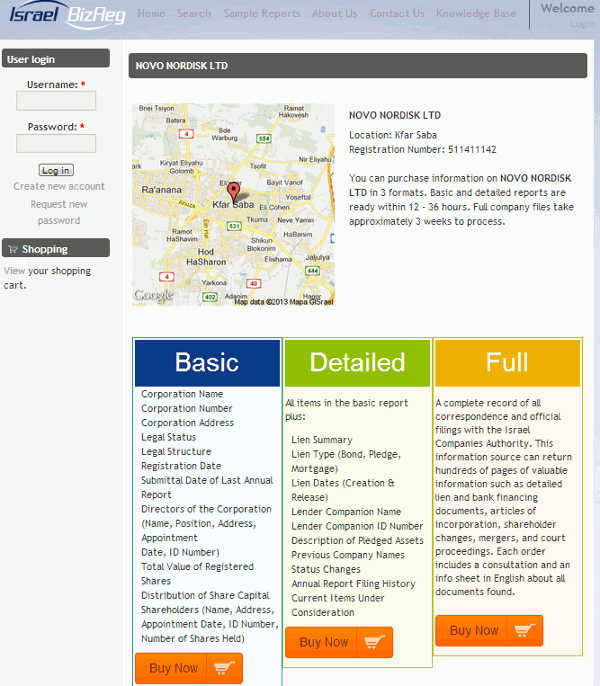
Another company that provides similar services is UK based 7Side (http://www.7side.co.uk/). Like IsraelBizReg it is pay as you go and they offer a translation service.
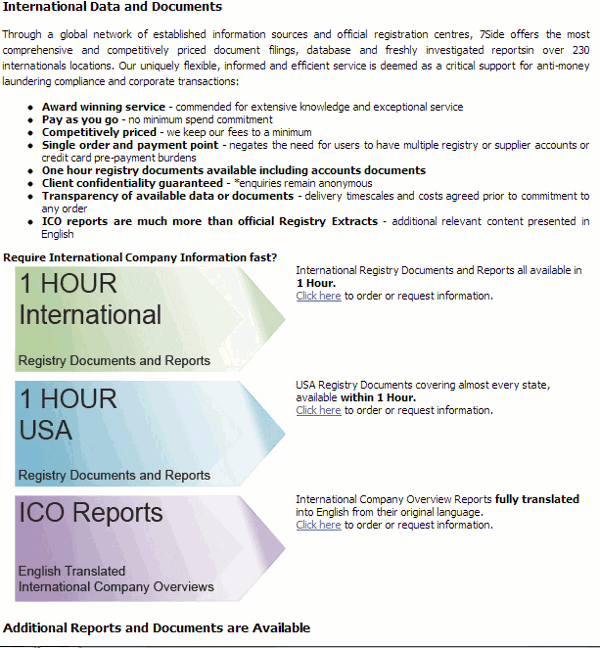
A summary of what is available and the costs involved for International Registry Documents and Reports all available in 1 hour is at http://www.7side.co.uk/moreinfo/International_Registry_and_Documents_Service.pdf.
The price list for English translated International company overviews is at http://www.7side.co.uk/moreinfo/marksales/7Side_ICO_Reports.pdf.
Company information: Luxembourg and Belgium
I am updating the official registries section of my business sources listings (http://www.rba.co.uk/sources/registers.htm) and there are changes to the entries for Luxembourg and Belgium.
The Registre de Commerce et des Sociétés – Accueil (http://www.rcsl.lu/) is the official register of companies and associations in Luxembourg. The search options are limited to company name or number and the interface is in German and French. Searching and company name, address and contact details are free of charge. Documents are priced.
Legilux Sociétés et Associations has more search options at http://www.legilux.public.lu/entr/search/index.php and it provides a history of the documents filed by a company. This is a free service but for the documents themselves you have to go back to the Registre de Commerce et des Sociétés where there is a charge per document.
In Belgium the KBO Public Search (http://economie.fgov.be/nl/ondernemingen/KBO/Pubd/PuS/)
enables you to search for public information on every registered active enterprise and establishment. Search by company number, name, branch number or name, address and municipality. Each record provides name, company number, activities, address, contact details and links to other sites for official documents and annual reports. The search interface is available in Dutch and French. The information is in Dutch or French and is free.
The CBSO (Central Balance Sheet Office) section of the National Bank of Belgium (http://www.bnb.be/) has the accounts of companies, associations and foundations active in Belgium. The search interface is available in Dutch, French, German and English and the services is free.
Many thanks to Inez de Bois for the information and updates.
Business Information Workshops – September
There is a lot happening in the UK business information sector at the moment. From two of my earlier postings on company information you will probably have gathered that competition between the providers is hotting up. And if you need statistics then the open data initiatives provide direct access to raw data – possibly.
If you are interested in business information and want to get up to speed with current developments I am running a UKeiG workshop on the topic on Thursday, 8th September. It is being held in Bristol at the Frenchay Campus of the University of the West of England. Further details are on the UKeiG web site at http://www.ukeig.org.uk/trainingevent/keeping-good-company-quality-business-information-web-karen-blakeman. The emphasis will be on free and pay per view services. Please note that you do not have to be a member of UKeiG to attend, and the workshop will be relevant to all types of organisations.
If you are new to business information I am also running a workshop entitled “Introduction to Business Research” for TFPL on 15th September in London (http://www.tfpl.com/training/courses/coursedesc.cfm?id=TR1116&cid=rs)
Company Information: Company Check gives more UK data for free
I first reviewed Company Check (http://www.companycheck.co.uk/) earlier this year (Free UK company information http://www.rba.co.uk/wordpress/2011/01/10/free-uk-company-information/). Since then they have made more UK company information available free of charge. As well as Cash at Bank the service also shows 6 years of figures and graphs for Net Worth, Total Liabilities and Total Current Liabilities. Data is taken from official Companies House documents. Documents can be purchased through UK Data (http://ukdata.com/) but they are much more expensive than ordering direct from Companies House (http://www.companieshouse.gov.uk/) or bizzy (http://bizzy.co.uk/). UK Data’s detailed credit reports are worth considering though if you want more in depth analysis. Although Company Check lists the company directors it does not show other directorships as does bizzy. (See my previous posting Company information: Bizzy for UK company data and credit ratings http://www.rba.co.uk/wordpress/2011/07/19/company-information-bizzy-for-uk-company-data-and-credit-ratings/). This is another very useful site that I recommend you add to your company information toolkit.
